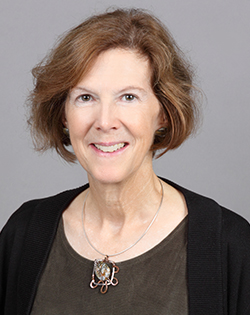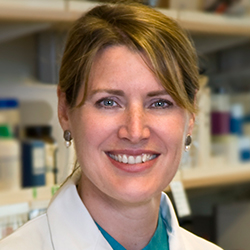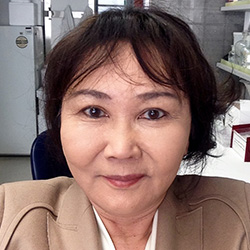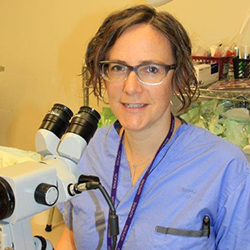In recognition of International Women’s Day on March 8, the UBC Faculty of Medicine is celebrating women in research by speaking with some of our leading researchers in cancer, heart and lung, population health, and brain and chronic disease.
Lynn Raymond is a UBC Professor in the Department of Psychiatry, Clinic Director of the Centre for Huntington Disease, and Director of the UBC MD/PhD Program. A renowned neuroscientist and neurologist, Dr. Raymond has devoted her career to better understanding the specific roles of altered neuronal circuits and amino acid neurotransmitter receptors – like the NMDA-type glutamate – in the hereditary brain disorder, Huntington disease.
We spoke with Dr. Raymond about her interest in neurology, her current research project and the benefits of pursuing a career in scientific research.
What sparked your interest in neurology and pursuing research in Huntington’s disease?

Lynn Raymond
My interest in neurology stemmed from my deep interest in understanding the structure and function of the brain, as well as disorders of the brain.
After completing my MD/PhD in the Medical Scientist Training Program (MSTP) in New York and my neurology residency and postdoctoral fellowship at John Hopkins Medical School, I was offered a faculty position in the Department of Psychiatry at UBC, where I met Dr. Michael Hayden.
We began a collaboration to understand the underlying factors that can lead to the dysfunction and death of neurons in the neurodegenerative disorder Huntington disease. The NMDA-type glutamate receptor is believed to be a part of the functional changes that accompany this progressive brain disorder. Dr. Hayden is a world leader in Huntington disease, and we have had a very productive research collaboration for the past 22 years, while also establishing the first multi-disciplinary clinic in Canada for patients and families with Huntington disease.
What are you working on now?
I am working on understanding the changes that occur at synapses – connections between neurons – at the very early stages in Huntington disease. At this stage, gene mutation carriers are not obviously affected but individuals may begin to have difficulty with memory, new learning, planning and organization.
My lab is especially interested in synapses in the area of the brain associated with motor systems – which is the region most affected in Huntington disease. We hope to identify mechanisms that can be targeted by therapies to improve cognitive function and extend the time people carrying the hereditary disease can function at a high level, including staying at work.
We also hope that some of these therapies might be neuroprotective and will slow progression of the disease.
What advice would you offer women wanting to pursue a career in scientific research?
Scientific research is one of the most rewarding and exciting careers available to those who are creative, enjoy problem solving and the thrill of new discoveries. Scientific research is a career of continuous learning and growing, so it is never dull.
The other piece of advice I would give women who are interested in a career in scientific research is to not be afraid of taking risks in terms of research projects and questions. Women can be more risk-averse than their male counterparts in science, which is a disadvantage in achieving the high impact results – this is advice I need to constantly give myself!
Meet some of our other leading researchers
Marianne Sadar
Marianne Sadar, a UBC Professor in the Department of Pathology and Laboratory Medicine, recently developed an experimental drug that shrinks advanced prostate cancer tumours in the lab. It is the first drug in the world that targets the “engine” of the tumour that causes the cancer to grow.
We caught-up with Dr. Sadar to learn more about her journey into cancer research, her recent drug discovery and the strengths that she feels women bring to the scientific community.
Joanne Matsubara
Joanne Matsubara, a UBC Professor in the Department of Ophthalmology and Visual Sciences, is examining age-related macular degeneration (AMD) – a chronic disease and major cause of blindness among the elderly.
We spoke with Dr. Matsubara about her journey in research, her current projects and what she hopes to accomplish.
Sheona Mitchell-Foster
Sheona Mitchell-Foster is an Assistant Professor with UBC’s Northern Medical Program based in Prince George, B.C. She is also a practicing obstetrician gynecologist and researcher, who is dedicated to examining cervical cancer prevention and the reproductive health of marginalized and vulnerable populations.
We spoke with Dr. Mitchell-Foster to learn more about what sparked her interest in pursuing a career as a clinician-scientist, her current research projects and what advice she would offer to women wanting to enter the scientific community.
Nadia Khan
Nadia Khan, a UBC Professor of Medicine in the Division of General Internal Medicine, was recently named President of Hypertension Canada. Dr. Khan’s research mainly focuses on cardiovascular disease among specific populations.
We spoke with Dr. Khan about her research interests, what she is working on now and what advice she would offer women wanting to pursue a career in scientific research.



